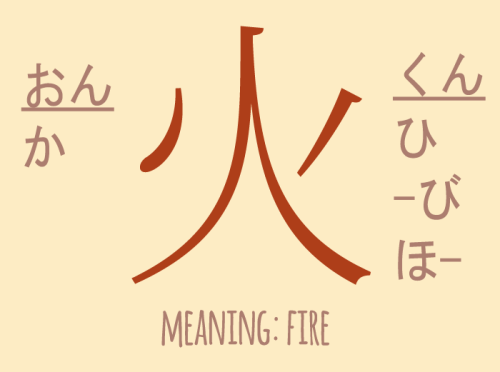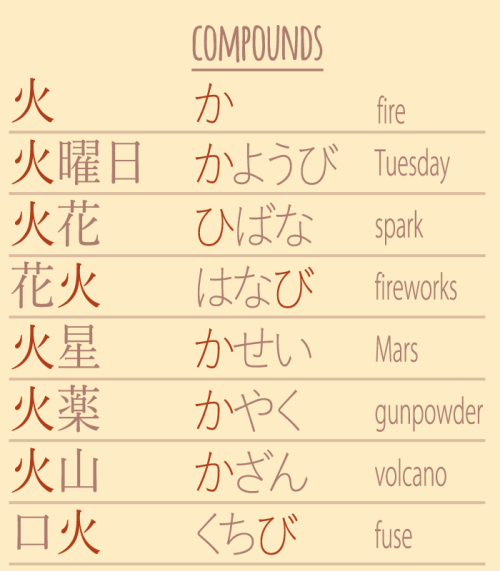This Is Maybe The Most Frustrating Aspect Of Studying Kanji. You Start Learning 山 As やま. Cool,
This is maybe the most frustrating aspect of studying kanji. You start learning 山 as やま. Cool, one kanji memorized. Wait… it can also be read as さん.
Wait. All your other kanji have 2 or 4 extra readings too! Some are on'yomi. Some are kun'yomi.
Why does this have to be so complicated?!
It may seem confusing at first, but if you learn the difference between on'yomi/kun'yomi readings, where they came from, and how they work, we promise it will make learning kanji a lot easier.
Listen to this kanji-tastic episode where Kristen explains all this and more. When you’re breezing through kanji like a pro, you’ll be glad you did.
More Posts from Earthquakedeer and Others

N5 verb list
会う (あう)- to meet
開く (あく)- to become open
開ける (あける)- to open
上げる (あげる)- to give
遊ぶ (あそぶ)- to play, to make a visit
あびる - to bathe, to shower
洗う (あらう)- to wash
ある - to be, to have (inanimate)
歩く (あるく)- to walk
言う (いう)- to say
行く (いく)- to go
居る (いる)- to be, to have (animate)
要る (いる)- to need
入れる (いれる)- to put in
歌う (うたう)- to sing
生まれる (うまれる)- to be born
売る (うる)- to sell
起きる (おきる)- to get up
置く (おく)- to put
教える (おしえる)- to teach, to tell
押す (おす)- to push, to stamp
覚える (おぼえる)- to remember
泳ぐ (およぐ)- to swim
降りる (おりる)- to get off, to descend
終わる (おわる)- to finish
買う (かう)- to buy
返す (かえす)- to return something
帰る (かえる)- to return, to go back
かかる - to take time or money
書く (かく)- to write
かける - to call by phone
貸す (かす)- to lend
借りる (かりる)- to borrow
消える (きえる)- to disappear
聞く (きく)- to hear, to listen, to ask
切る (きる)- to cut
着る (きる)- to put on
曇る (くもる)- to become cloudy/dim
来る (くる)- to come
消す (けす)- to erase, to turn off
答える (こたえる)- to answer
コピーする - to copy
困る (こまる)- to be worried
咲く (さく)- to bloom
差す (さす)- to stretch out, to raise
散歩する (さんぽする)- to stroll
死ね (しね)- to die
閉まる (しまる)- to close, to be closed
閉める (しめる)- to close something
締める (しめる)- to tie
知る (しる)- to know
吸う (すう)- to smoke
住む (すむ)- to live in
する - to do
座る (すわる)- to sit
掃除する (そうじする)- to clean, to sweep
出す (だす)- to put out
立つ (たつ)- to stand
頼む (たのむ)- to ask
食べる (たべる)- to eat
違う (ちがう)- to differ
使う (つかう)- to use
疲れる (つかれる)- to get tired
着く (つく)- to arrive at
作る (つくる)-to make
つける - to turn on
勤める (つとめる)- to work for someone
出かける (でかける)- to go out
できる - to be able to
出る (でる)- to leave, to go out
取る (とる)- to take something
撮る (とる)- to take a photo or film
鳴く (なく)- to chirp, roar, croak etc
無くす (なくす)- to lose something
習う (ならう)- to learn
並ぶ (ならぶ)- to line up, to stand in line
並べる (ならべる)- to line up, to set up
なる - to become
脱ぐ (ぬぐ)- to take off clothes
寝る (ねる)- to sleep, to go to bed
登る (のぼる)- to climb
飲む (のむ)- to drink
乗る (のる)- to ride, to get on
入る (はいる)- to enter, to contain
はく - to wear, to put on trousers
始まる (はじまる)- to begin
走る (はしる)- to run
働く (はたらく)- to work
話す (はなす)- to speak
貼る (はる)- to stick
晴れる (はれる)- to be sunny
引く (ひく)- to pull
弾く (ひく)- to play an instrument
吹く (ふく)- to blow (wind)
降る (ふる)- to fall (rain, snow)
勉強する (べんきょうする)- to study
曲がる (まがる)- to turn, to bend
待つ (まつ)- to wait
磨く (みがく)- to brush teeth, to polish
見せる (みせる)- to show
見る (みる)- to see, to watch, to look
持つ (もつ)- to hold
休む (やすむ)- to rest
やる - to do
行く (ゆく)- to go
呼ぶ (よぶ)- to call out, to invite
読む (よむ)- to read
練習する (れんしゅうする)- to practice
分かる (わかる)- to be understood
忘れる (わすれる)- to forget
渡す (わたす)- to hand over
渡る (わたる)- to go across
伊達メガネ
伊達メガネ (だてめがね) - glasses that are just a fashion accessory, not something one needs because of bad eyesight
The first word, 伊達, means “elegance, having style, doing something just for show” and メガネ is, of course, “glasses”.


some compounds of one of my favourite kanji, 火

行きます|つもり|ようと思う Hey guys, it’s been a while since I’ve made a post on this blog! I’ve been so busy with university and then as soon as my last exam was over I traveled back home to see my family! I finally have some time to myself so I thought I’d make a new post! This is all about how to say doing something in Japanese. This post won’t go into too much depth regarding these sentence patterns, so feel free to look them up for more information on how to use them! 行きます・Going to do: To say, “I’m going to__” in Japanese, you can follow this sentence pattern. Sentence pattern = subject+を+verb stem (ます form without the ます) +に+行きます・行く。 e.g. 何をしますか? What are you doing? 映画を見に行きます。 Going to see a movie. つもり・Plan to do: But what about how to say you intend on doing something, or you plan on doing something? In that case, you can use つもり! Sentence pattern = verb dictionary form+つもり+です・だ。
e.g. 明日は何をしますか? What will you do tomorrow? カラオケに行くつもりです。 I intend to go to karaoke. ようと思う・Think I’ll do: To say that you’re thinking of doing something, you can follow this sentence pattern: Sentence pattern = verb volitional form+ようと思う e.g. で今晩こそ早く寝ようと思う。 I think I’ll go to sleep early tonight.
German da-compound words
(english to german)
1. Above that - darüber
2. Through that - dadurch
3. Around that - darum
4. Out of that - daraus
5. With that - damit
6. After that - danach
7. For that - dafür
8. From that - davon
9. Against that - dagegen
10. In that - darin
11. Under that- darunter
12. Next to that - daneben
13. Behind that - dahinter
14. On that - darauf

我田引水
がでんいんすい
Literally: Drawing water for your own rice paddy. Meaning: Doing or saying things for your own benefit.
(via uni-venture)
Kanji vocab #1
彼: かれ、かの he
彼(かれ) he, boyfriend
彼女(かのじょ)she, girlfriend
彼ら(かれら)they
代:ダイ、か age; replace
時代(じだい)age, era
電気代(でんきだい)electricity fee
九十年代(きゅうじゅうねんだい)the 90’s
十代(じゅうだい) in one’s teens
〜代わりに(かわりに)instead of ~
留: リュウ、ル to stay; to keep
留守(るす)absence, not at home
留学生(りゅうがくせい)foreign student
留学する(りゅうがくする)to study abroad
族: ゾク family; tribe
家族(かぞく)family
民族(みんぞく)race
水族館(すいぞくかん)aquarium
王族(おうぞく)member of royalty
親:シン、おや、した parent; intimacy
父親(ちちおや)father
母親(ははおや)mother
親友(しんゆう)best friend
両親(りょうしん)parents
親しい(したしい)intimate
親切(しんせつ)kind
切: セツ、き、きっ to cut
切る(きる)to cut
切手(きって)postage stamp
切符(きっぷ)ticket
大切(たいせつ) precious
親切(しんせつ)kind
英: エイ English; excellent
英雄(えいゆう)hero
英語(えいご)English
店: テン、みせ shop/store
店員(てんいん)store clerk
売店(ばいてん)stall
書店(しょてん)bookstore
去: キョ、コ、さ past; to leave
去年(きょねん)last year
過去(かこ)the past
去る(さる)to leave
消去する(しょうきょする)to erase
急: キュウ、いそ to hurry; emergency
急に(きゅうに)suddenly
急行(きゅうこう)express train
急ぐ(いそぐ)to hurry
特急(とっきゅう)super express
乗: ジョウ、の to ride
乗る(のる)to ride
乗車(じょうしゃ)riding a car
乗馬(じょうば)horseback riding
乗り物(のりもの)vehicle
当:トウ、あ to hit
本当(ほんとう)really
お弁当(おべんとう)bento box
当時(とうじ)at that time
当たる(あたる)to hit
音:オン、と、ね sound
音楽(おんがく)music
音(おと)sound
本音(ほんね)real intention/thoughts
発音(はつおん)pronunciation
楽:ラク、ガク、ガッ、たの pleasure
楽しい(たのしい)fun
楽しむ(たのしむ)to enjoy
楽器(がっき)musical instrument
楽(らく)easy, comfortable
音楽(おんがく)music
医:イ doctor; medicine
医者(いしゃ)doctor
歯医者(はいしゃ)dentist
医学(いがく)medical science
医院(いいん)clinic
者: シャ、もの person
学者(がくしゃ)scholar
医者(いしゃ)doctor
若者(わかもの)young people
読者(どくしゃ)reader
Dark German Vocab

Vergangenheit (f) - past Gegenwart (f) - present Zukunft (f) - future
Zeit (f) - time Zeitreise (f) - time travel Wurmloch (n) - wormhole schwarzes Loch (n) - black hole Maschine (f) - machine Zeitmaschine (f) - time machine
Kind(-er) (n) - child(-ren) Elternteil (m) - parent Fremder (m) - stranger Polizei (f) - police
Selbstmord (m) - suicide Brief (m) - letter Höhle (f) - cave Wald (m) - forest Atomkraftwerk (n) - nuclear power plant
vermisst [inf. vermissen] - missing [inf. to miss] verschwinden - to disappear
zweitausendneunzehn - 2019 neunzehnhundertsechsundachtzig - 1986 neunzehnhundertdreiundfünfzig - 1953
Let me know if there are any mistakes!
-
 bjorn-k liked this · 4 years ago
bjorn-k liked this · 4 years ago -
 99cakereviews reblogged this · 4 years ago
99cakereviews reblogged this · 4 years ago -
 probablynoturmom liked this · 4 years ago
probablynoturmom liked this · 4 years ago -
 thewhitecyborg liked this · 4 years ago
thewhitecyborg liked this · 4 years ago -
 writinredhead liked this · 4 years ago
writinredhead liked this · 4 years ago -
 tratratrash liked this · 5 years ago
tratratrash liked this · 5 years ago -
 qrred liked this · 5 years ago
qrred liked this · 5 years ago -
 genkitea reblogged this · 5 years ago
genkitea reblogged this · 5 years ago -
 genkitea liked this · 5 years ago
genkitea liked this · 5 years ago -
 not-the-children liked this · 5 years ago
not-the-children liked this · 5 years ago -
 emily621lee-blog liked this · 6 years ago
emily621lee-blog liked this · 6 years ago -
 imbc72 liked this · 6 years ago
imbc72 liked this · 6 years ago -
 infinitely-free-and-independent liked this · 6 years ago
infinitely-free-and-independent liked this · 6 years ago -
 count-your-shadows liked this · 6 years ago
count-your-shadows liked this · 6 years ago -
 jibun-studies liked this · 6 years ago
jibun-studies liked this · 6 years ago -
 blacklinguist reblogged this · 6 years ago
blacklinguist reblogged this · 6 years ago -
 despaseato reblogged this · 6 years ago
despaseato reblogged this · 6 years ago -
 nekomaniya liked this · 6 years ago
nekomaniya liked this · 6 years ago -
 madurosafo liked this · 6 years ago
madurosafo liked this · 6 years ago -
 nabomee liked this · 6 years ago
nabomee liked this · 6 years ago -
 umami-lolipop liked this · 6 years ago
umami-lolipop liked this · 6 years ago -
 fifth-of-arcana liked this · 6 years ago
fifth-of-arcana liked this · 6 years ago -
 journalpeaches-blog reblogged this · 6 years ago
journalpeaches-blog reblogged this · 6 years ago -
 journalpeaches-blog liked this · 6 years ago
journalpeaches-blog liked this · 6 years ago -
 thisismyp0rnaccount reblogged this · 6 years ago
thisismyp0rnaccount reblogged this · 6 years ago -
 mulmod-japanese reblogged this · 7 years ago
mulmod-japanese reblogged this · 7 years ago -
 giamope liked this · 7 years ago
giamope liked this · 7 years ago -
 hellohellojapan-blog liked this · 7 years ago
hellohellojapan-blog liked this · 7 years ago -
 pksdns liked this · 7 years ago
pksdns liked this · 7 years ago -
 minivaquita reblogged this · 7 years ago
minivaquita reblogged this · 7 years ago -
 lavenderswirls reblogged this · 7 years ago
lavenderswirls reblogged this · 7 years ago -
 startledbirb liked this · 7 years ago
startledbirb liked this · 7 years ago -
 xredmemory liked this · 7 years ago
xredmemory liked this · 7 years ago -
 thelonewolf48 reblogged this · 7 years ago
thelonewolf48 reblogged this · 7 years ago -
 laeyra reblogged this · 7 years ago
laeyra reblogged this · 7 years ago -
 houkikumowomita liked this · 7 years ago
houkikumowomita liked this · 7 years ago -
 wotcher-axel liked this · 7 years ago
wotcher-axel liked this · 7 years ago
Just a person learning Japanese. Self-learner. If you're also studying Japanese and want to practice with someone (and you're also very much a beginner) then message me! はじめまして! さびーなです。よとしく!
196 posts